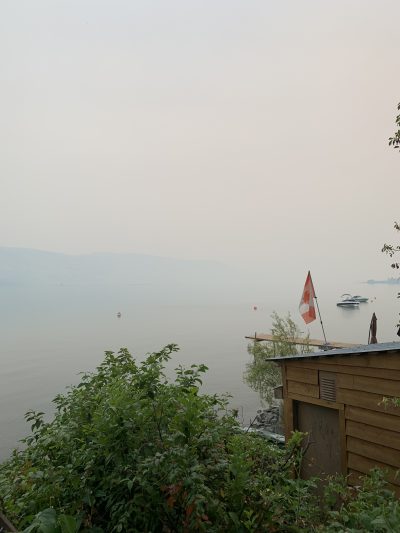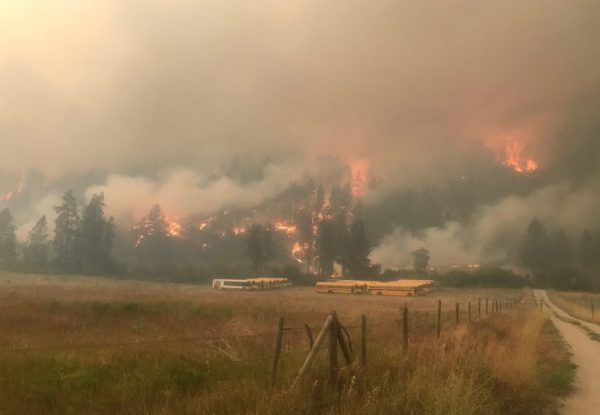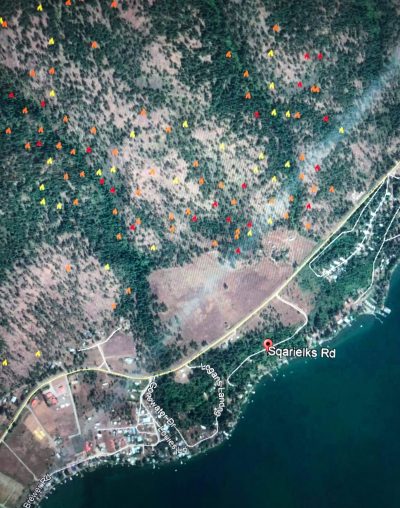I’m On Fire has always been one of my favourite Bruce Springsteen songs. There’s a memory that stands out where I was driving to my family’s cabin in the Okanagan Valley one summer, listening to I’m On Fire while I watched helicopters overhead dip into the nearby lake to put out fires on the mountain right next to the highway. The reality is many of our recent summers have been shrouded in smoke at one point or another, but this summer has really felt like no other, especially for my family.

The view South from our cabin towards Vernon
We’ve had a small family cottage on the Northern tip of the Okanagan, on traditional suknaqinx land, for 14 years. It’s a humble cottage that’s been filled with memories of summers spent with countless friends and holidays with family. This past summer though, what initially felt familiar – cloudy and slightly smoky days so quickly (far too quickly) turned into being glued to news reports and relayed updates through a network of neighbours and kind strangers.
Early texts and messages between my parents my brother and I were coloured with cautious optimism that things would get better, blow over as they usually do. Quickly though, the use of any adverb that was connected to the wind became poor taste.
What we thought would be passing smoke turned into the simple realities of an evacuation. The alert was issued and my parents raced to load up their cars. My mom immediately went into prioritization: what do we take? Do I need to take photos of everything for the insurance? (She ended up taking a video of every room.)
The evacuation order followed shortly after and then the feeling of helplessness settled in. The fridge is full but the power is out. Will all the food rot? Is the cottage going to smell horrible? What if we had left the sprinklers on, would that help? Will there even be a cottage left? Thankfully, our very close friends who used to live two houses down from us extended their homes and hospitality to my parents.

What filled the space otherwise overrun by worry was constant checking of news sites and the grown-up version of telephone between friends
who lived in nearby Vernon. “It sounds like the wind isn’t too bad today.” “We heard that no buildings on the Okanagan Indian Band land have been impacted. Yet.”
It still felt like the fire was far away, we hadn’t really seen the red, orange, and yellow tongue licking at the skyline or at the trees. Then, we received a video from someone who had managed to boat past the shoreline and our eyes widened as we saw massive plumes of smoke rising from the mountain just behind our cabin. The fire wasn’t far away at all.
The feeling of helplessness magnified and all that was left to do was pray. For rain, for the wind to slow, stop or just simply change directions. The beautiful old-growth pine trees surrounding us, the ones we were always grateful to on hot summer days for shade now looked like matchsticks waiting to be struck. We knew fire crews were working tirelessly and endlessly to save homes but ultimately the weather was deciding what buildings would stay and what would go.

A wildfire map of active fires marked by severity (yellow – less severe, red – more severe) with the red pin locating our cabin.
To date, the Okanagan Indian Band has confirmed that 10 dwellings and one building have been destroyed by the White Rock Lake wildfire, with another four dwellings sustaining damage. Yesterday (Aug 24, 2021), the evacuation order was rescinded for The Head of the Lake area, where our cabin is located fire crews engaged in a controlled back burn help to help tie in existing fireguards to the fire perimeter. However, we know that orders can be rescinded at any time.
My family and I know families all across the Okanagan Valley are endlessly thankful to the fire crews, the emergency crews, the communications teams, and any other front-line emergency response teams.
Climate change’s impact means summers moving forward are likely to never look the same. But what I find some sort of comfort in is knowing that there’s something simple that I, my family, and my friends can do – plant trees.
— Story by Brieanne Biblow
Restore The Forest
TreeEra’s Restore The Forest campaign is looking to re-plant 1 hectare out of the 142 million hectares of forests that have been lost to forest fires in 2021. We believe we’re stronger as a community when we all pull together and take one small step off the sidelines in the fight against climate change.




